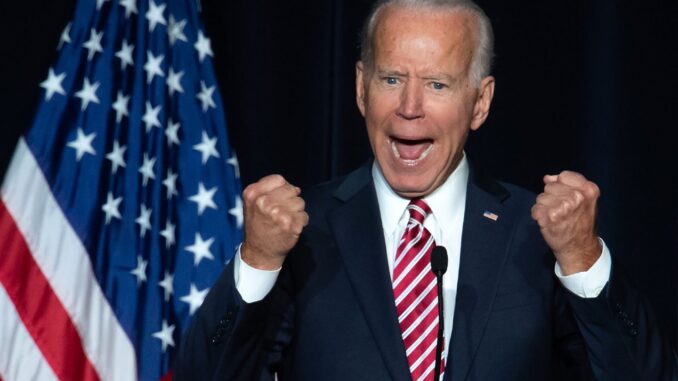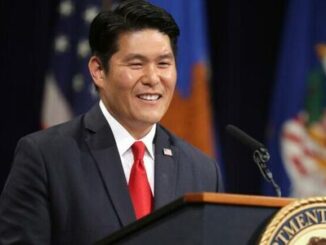
BERNSTEIN TOUTS OIL AND GAS LEASE SALES: The White House is using new oil and gas leasing mandates in Democrats’ Inflation Reduction Act to shield President Joe Biden and the party from accusations that their energy policy is crippling domestic production of fossil fuels.
White House Council of Economic Advisers member Jared Bernstein, in an interview on yesterday’s “Fox News Sunday,” offered a recent quote from environmental NGO Sierra Club regretting the inclusion of language in the law that directs more leasing for oil and gas in order to demonstrate how the administration is supporting more domestic production.
“‘For all of its good, the new climate legislation also mandates oil and gas drilling on public lands,’” Bernstein said, reading the quote to host Shannon Bream. “So, that’s the Sierra Club complaining about aspects of the Inflation Reduction Act that open up new lands for leasing.”
Bernstein emphasized the nearly $370 billion in tax credits, grants, and other incentives to serve a “hastening” of the transition to green energy but disputed the notion that the administration isn’t doing things to facilitate more production at home: “This is a walk and chew gum moment — I don’t think anyone can, based on the facts, accuse this administration of not fulfilling both of those obligations right now,” he said.
Breaking it down: The IRA’s oil and gas language made the cut at the behest of Joe Manchin, the Senate Energy and Natural Resources chairman and holdout vote who pledged not to vote for something he saw as too aggressive against fossil fuels.
Biden, who as a candidate promised restrictions to oil and gas leasing, ordered a pause on new leasing when he entered the White House and sought major reforms to the leasing programs.
He’s achieved that to a degree with higher royalty rates and rents and new methane regulations — all of which were passed into law in the Inflation Reduction Act. At the same time, the signature legislative achievement of this Congress has, in the words of the Interior Department, removed the administration’s discretion over a number of lease sales.
Manchin’s deal with Majority Leader Chuck Schumer ultimately won support of every sitting Democrat in Congress, even the most hawkish on climate change – who had to hold their noses to vote for a bill with language ordering specific lease sales to be held.
The law resurrected three canceled offshore lease sales that Biden’s Interior Department canceled in May, and it reinstated Lease Sale 257, the lone offshore lease sale to be held since Biden took office. (Remember: Judge Rudolph Contreras vacated 257 and remanded it to the agency. That decision was appealed and has been tied up in court ever since and remains so.)
The IRA also tied the development of renewable energy on federal lands and in federal waters to the continuance of oil and gas leasing. Together, the provisions revamped the leasing programs, which have been beset by litigation, irregular sales, and missed deadlines.
More on the politics: Now, three weeks out from the midterm election when gas prices remain elevated and Democrats’ are defending the slimmest of majorities, the White House is marketing the leasing revamp to show it supports more domestic production.
For most of the year, high energy prices, especially for retail gasoline, have plagued Biden. Republican lawmakers have attacked his energy policy for favoring restrictions on leasing and the oil and gas industry more broadly at a time when oil and gas are expensive.
Many green groups, alternatively, have criticized the administration for not being aggressively green enough by doing things like approving more exports of liquefied natural gas, for leasing new federal acreage, and for considering a plan to make more acreage available for leasing over the next five years.
Welcome to Daily on Energy, written by Washington Examiner Energy and Environment Writers Jeremy Beaman (@jeremywbeaman) and Breanne Deppisch (@breanne_dep). Email jbeaman@washingtonexaminer.com or bdeppisch@washingtonexaminer.com for tips, suggestions, calendar items, and anything else. If a friend sent this to you and you’d like to sign up, click here. If signing up doesn’t work, shoot us an email, and we’ll add you to our list.
OPEC+ MEMBERS JOIN FORCES TO REJECT ‘COERCION’ ACCUSATION: OPEC+ countries said yesterday that they supported the decision to slash oil output by 2 million barrels per day, attempting to project a unified front with Saudi Arabia and reject the White House’s assertion that Riyadh had “coerced” them into supporting the cuts.
Saudi King Salman bin Abdulaziz said yesterday that the decision was intended to provide stability and balance in global oil markets, despite a spike in demand. His son, defense minister Prince Khalid bin Salman, said the decision was “unanimous” among OPEC+ members.
The UAE’s energy minister, Suhail al-Mazrouei, reaffirmed Riyadh’s position: “I would like to clarify that the latest OPEC+ decision, which was unanimously approved, was a pure technical decision, with NO political intentions whatsoever,” he wrote on Twitter yesterday.
…As did Iraq: “There is complete consensus among OPEC+ countries that the best approach in dealing with the oil market conditions during the current period of uncertainty … is a pre-emptive approach that supports market stability and provides the future the guidance it needs,” Iraq’s Oil Marketing Company (SOMO) said in a statement.
As did Kuwait, Oman, Bahrain, and Algeria, who issued their own similar statements of support.
Their remarks come after U.S. national security spokesman John Kirby told reporters Thursday that “more than one” OPEC+ country told the U.S. they had felt pressured by Saudi Arabia into supporting the cuts.
BRUSSELS TO PROPOSE A TEMPORARY GAS PRICE ‘CEILING’: The European Commission is slated to unveil a temporary gas price ceiling this week that would establish a “last resort” dynamic maximum price on natural gas, allowing it to intervene in case of emergency.
According to a draft proposal, the mechanism will allow the EU to act in cases of extreme natural gas prices for up to three months without hurting supply security or encouraging “excess consumption.”
It also puts mandatory limits on the amount that prices can fluctuate in a single day, and encourages more cooperation among member states on gas purchasing and refilling its storage tanks before next winter.
Still, the bloc remains divided on the issue of a price cap. Last month, 15 member states, including France, Italy, and Spain urged the commission to propose a price cap on wholesale gas transactions to help drive down prices.
Others, such as Germany, have opposed the cap—arguing that it could turn away potential LNG suppliers in a competitive global market and worsen the bloc’s existing supply crisis.
Where things stand: Currently, Europe’s gas storage tanks are filled to more than 90% capacity, due in large part to additional LNG supplies from Norway and the U.S. In theory, that (along with reduced consumption in households this winter) should be enough to last Europe through March. But much could go wrong, including a colder-than-expected winter, or risks to existing energy infrastructure. Europe has been on guard following the attacks on the Nord Stream 1 and 2 Russian gas pipelines last month.
On the consumption side, leaders are hoping to make good on their 15% gas reduction target set earlier this summer—a voluntary step that could become mandatory in event of a supply crisis.
What’s next: The European Commission will release its proposed emergency energy plan tomorrow. EU leaders will then convene in Brussels at the end of the week for a summit to discuss next steps.
…MEANWHILE, GAZPROM CEO THREATENS SUPPLY CUTOFF: Gazprom CEO Alexey Miller said yesterday that any plans to cap prices of Russian gas exports would lead to a supply cutoff, echoing a similar warning from Russian President Vladimir Putin last month.
“Such a one-sided decision is of course a violation of existing contracts, which would lead to a termination of supplies,” Miller said in an interview with Russian state broadcasters.
Putin first warned of a supply cutoff last month. Speaking at an economic forum in Russia, Putin described the West’s plans to impose a price cap on oil and gas exports as “stupid” and said they would not come without consequence.
“We will not supply anything at all if it contradicts our interests,” Putin said. “We will not supply gas, oil, coal, heating oil—we will not supply anything.”
Putin then invoked a famous Russian fairy tale, “The Sister-Fox and the Wolf,” warning that, without its fossil fuels, the West would be “frozen” like the wolf’s tail in the fable.
BP TO PURCHASE ARCHAEA ENERGY: BP is acquiring the U.S.-based renewable natural gas company Archaea Energy in a $4.1 billion deal, Archaea said this morning, as the British energy giant seeks to up its investments in the renewable energy space.
The deal is expected to be complete by the end of the year, Archaea said. As Reuters reports, it is BP’s largest acquisition since BP CEO Bernard Looney took the reins of the company two years ago, vowing to slash its greenhouse gas emissions and expand its business on the renewables side.
CHINA’S XI PREVIEWS CLEAN ENERGY AMBITION AND CLIMATE CONSERVATION: Chinese President Xi Jinping vowed yesterday to prioritize issues such as clean energy, climate initiatives, and conservation in the coming years, describing the efforts as “essential” for the Communist Party agenda as he prepares for a third presidential term.
Speaking to 2,300 delegates at the opening ceremony for the Communist Party Congress, Xi vowed an “energy revolution,” promising to “basically eliminate” heavy air and water pollution, and touted Beijing’s accomplishments on other environmental issues. “Ecological and environmental protection has undergone a historical, transformational and comprehensive change – our motherland’s skies are bluer, the mountains are greener and the water is clearer,” Xi said.
He also noted that China would continue to promote the “clean and efficient use of coal,” which is expected to supply roughly 60% of its power in the near-term.
The proof will be in the pudding: China remains the world’s largest source of greenhouse gas emissions, and it is unclear whether Xi’s comments—which come shortly ahead of this year’s COP27 summit in Egypt—are anything beyond mere posturing.



